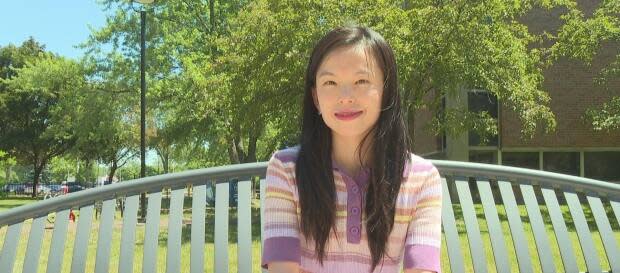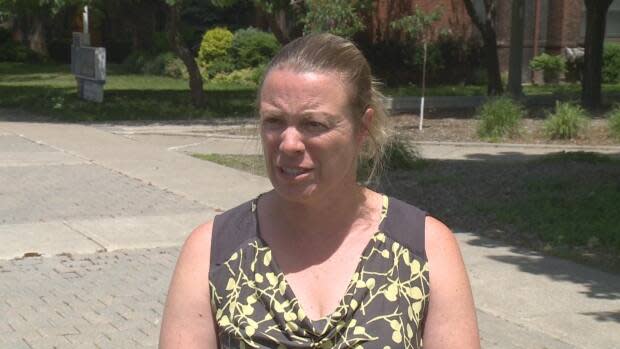It's hot in Windsor-Essex. But some feel the heat more than others

It's been two months since Windsor resident Allanah Drouillard's air conditioner broke.
On Wednesday — the third day of an ongoing heat warning — temperatures in Windsor soared to about 32 C.
Living in a five bedroom house in Sandwich Towne with her boyfriend, three children, two dogs, a rabbit and guinea pigs amid yet another heat wave has been "torture" for Drouillard and her family.
The couple is waiting on their landlord to get the air conditioner unit fixed, but it's unclear when that will happen. Until then, they've got fans, a window air conditioner, lots of Freezies and an above ground outdoor pool.
Drouillard told CBC News that she "dreaded" going about her day Wednesday, knowing temperatures were only going to climb.
"I could already feel the heat in the house. I woke up sweating and I was like 'mmm, this is not going to be a good day,'" she said.
Drouillard and her family live in one of Windsor's hottest neighbourhoods and they're community is also statistically less likely to be able to cope with intense heat waves, like the one the region is currently experiencing.
This sort of information is colour coded in a new app created by Carina Luo, a geospatial and data analyst at the University of Windsor.
"It's hard to be cautious when your house is starting to boil like you're in a stove, it's not fun." - Allanah Drouillard
Luo correlated heat exposure, defined as areas with high surface temperature, with social vulnerability statistics.
In Luo's research, social vulnerability relates to factors that make someone unable to cope, which can include their income and education levels, their age, housing conditions and their accessibility to essential services like community centres or health care providers.
CLICK: You can use Luo's app below
The extent to which someone can protect themselves, recover from or are impacted by an extreme weather event heavily depends on the resources available to them, according to Luo.
"I just want to highlight the environmental and social inequalities in relationship to climate change," she said.
"I just hope this app can help move the needle a bit in developing climate change mitigation and adaptation strategies from an equity lens."

Luo's app highlights areas across Windsor-Essex that are most vulnerable, these include:
Downtown Windsor.
Parts of Sandwich Towne.
Parts of Wyandotte Street East and Walkerville.
These regions, Luo said, possibly have lower tree canopy, older apartment buildings with poor air circulation and less greenspace, while also having a higher concentration of people who might be of lower income, are renting, have language barriers or live in older homes that might have poor ventilation and require repairs.
The purpose of pinpointing which areas are most at risk is to make policy makers, community advocates or organizations aware of the regions that require more resources or attention during intense heat waves.
It can also help the city prioritize where it should put new community centres or pools, cooling facilities and splash pads.
More heat waves projected
According to Karina Richters, the City of Windsor's Supervisor of Environmental Sustainability and Climate Change, southwestern Ontario is only expected to get hotter.
"Right now our baseline is 22 days where we exceed 30 C, but with our climate projections, by the mid-century or just a bit past we're looking at 70 days we're going to be exceeding 30 C," she said.
"So you know when you think about two or three days, 'I can get through these two or three days,' but when we start talking about we have weeks, like how is that going to change the vulnerability of the population?"

She said they are working to improve parts of the community, by increasing tree cover and creating more shade structures at parks. Richters also emphasized that it's about better educating residents on their risks and how to best protect themselves.
As of June 14, the City of Windsor said cooling centres are available, these include community centres, public libraries and the Homelessness & Housing Help Hub for those experiencing homelessness.
Splash pads are also available across the region, but residents will have to wait another week for public outdoor pools.
As for Drouillard, she said the closest splash pad is about a 45 minute walk away and it's hard to bring the children there on her own. She hopes the information from the app helps community leaders know where to prioritize their resources.
"I think that something should be done, have more community services available to families and elderly, anybody to help with this heat, instead of saying, 'watch out for heat stroke, it's hot, be cautious,'" she said.
"It's hard to be cautious when your house is starting to boil like you're in a stove, it's not fun."

